By Elise Schoening
Features Editor
When Maria Hinojosa stepped into the headquarters of NPR, she was overcome with nerves — an unfamiliar feeling for the award-winning journalist who covered everything from the fallout of 9/11 to the rise of Republican presidential nominee Donald Trump.
Born in Mexico City and raised in Chicago, Hinojosa became the first Latino hired at NPR. Walking into the whitewashed newsroom was more nerve-wracking for Hinojosa than hitting the streets of the South Bronx in New York City to report on the heroin epidemic there.

“I wasn’t terrified to be in those neighborhoods,” Hinojosa said. “I’ve reported in those neighborhoods. I’ve lived in those neighborhoods. I’ve partied in those neighborhoods... This is to say we all have a different perspective.”
In a lecture on Wednesday, Oct. 12, in Mayo Concert Hall, Hinojosa shared her story with students at the College for Hispanic Heritage Month.
“I am Mexican,” Hinojosa said. “I’m an immigrant, I’m a woman and I’m a journalist.”
Hinojosa spoke with pride. She stressed the need for diverse representation in the media and urged those before her to follow in her footsteps.
“I did what I am asking you to do. I’m asking you to own your own power, your own personal narrative,” Hinojosa said. “I jumped in and I created my own non-profit media company because who decides what stories are told and how stories are told really matters, especially now.”
Hinojosa, who was also the first Latina correspondent at CNN and PBS, launched her own non-profit news network, Futuro Media Group, in 2010. She has received four Emmy awards, among many other awards, in her 25 years as a reporter.
In her lecture, Hinojosa discussed the changing demographics in America. Minority populations are on the rise and yet, they are rarely represented in the mainstream media.
Through her reporting, Hinojosa has attempted to give voice to these groups.
“What I have dedicated my life to is to make the invisible visible,” Hinojosa said. “My job is to go into these communities and understand, ‘What’s going on for you?’”
To do so, Hinojosa has traveled the country, conducted countless interviews and told thousands of stories. Most recently, she spoke to Latino voters in Florida and Muslim Americans facing Islamophobia in Ohio.
“Being a Muslim American today in Cleveland, Ohio, is like being in Selma (Ala.), every single day,” one person told her. “We feel like we’re being attacked every day. We’re being watched. People’s bank accounts are being closed. Visas are being denied. People are being deported.”
Hinojosa collects these stories and diligently gathers the facts in order to tell the narrative of a changing America, one in which Islam is the fastest growing religion and Latinos have become one of the largest incarcerated groups in the nation.
She finds reporting on minority groups and demographic change exciting, whereas some of her colleagues have been apprehensive about approaching the topic. For Hinojosa, being bicultural is an advantage that colors her journalism and empowers her to seek out untold stories.
In the wake of 9/11, Hinojosa recognized that illegal immigrants would be among those affected by the terrorist attacks. She found the family of an undocumented immigrant who lost his life while working in the Twin Towers that day, and told his story to the nation.
This year, Hinojosa investigated the mysterious death of a Latino man in an Arizona detention center.
“A Mexican man committed suicide the same week that Sandra Bland died,” Hinojosa said. “Everyone knows Sandra Bland’s name. We don’t know José de Jesús.”
Throughout her career, Hinojosa has investigated the lives of minority groups and brought their issues and identities to the forefront. However, the mainstream media still has a ways to go.
In her lecture, Hinojosa shared her disappointment over the media’s coverage of the 2016 presidential election and the overwhelming lack of Latino representation.
“Mexicans. Latinos. Immigrants. Women. We are kind of front and center in the entire political conversation,” Hinojosa said. “And yet, none of us was chosen to ask one question at the presidential debates. How is that?”
Representation matters, Hinojosa said. Diversity within the newsroom and at presidential debates is of the utmost importance, as selected journalists have the power to shape the political conversation.
“What would have happened if we had Jewish journalists able to pose questions to Adolf Hitler?” Hinojosa said. “What would have happened we if had someone who lived that experience able to pose a question to him? What would have happened? Would things have changed?”







